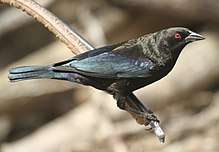Bronzed cowbird
The bronzed cowbird (once known as the red-eyed cowbird), (Molothrus aeneus), is a small icterid.
| Bronzed cowbird | |
|---|---|
 | |
| Scientific classification | |
| Kingdom: | Animalia |
| Phylum: | Chordata |
| Class: | Aves |
| Order: | Passeriformes |
| Family: | Icteridae |
| Genus: | Molothrus |
| Species: | M. aeneus |
| Binomial name | |
| Molothrus aeneus (Wagler, 1829) | |
 | |
| Range of M. aeneus Breeding range Year round range | |
It breeds from the southern U.S. states of California, Arizona, New Mexico, Texas, and Louisiana south through Central America to Panama. They tend to be found in farmland, brush, and feedlots. Outside the breeding season, they are found in very open habitats, and roost in thick woods. They forage in open areas, often nearby cattle in pastures. Their diet mostly consists of seeds and insects, along with snails during breeding season for a calcium source.[2]

There are three subspecies and an isolated population on the Caribbean coast of Colombia that is sometimes treated as a separate species, the bronze-brown cowbird (M. armenti):[3]
- M. a. loyei – Parkes & Blake, 1965: found in the southwestern United States and northwestern Mexico
- M. a. assimilis – (Nelson, 1900): found in southwestern Mexico
- M. a. aeneus – (Wagler, 1829): nominate, found in southern Texas (south central USA) and from eastern Mexico to central Panama
The male bronzed cowbird is 20 cm (7.9 in) long and weighs 68 g (2.4 oz), with green-bronze glossed black plumage. Their eyes are red in breeding season and brown otherwise. The female is 18.5 cm (7.3 in) long and weighs 56 g (2.0 oz). She is a dull black with a brown underbelly, and has brown eyes. Young birds have coloring similar to the females, with the exception of grey feather fringes.[4]
Like all cowbirds, this bird is an obligate brood parasite; it lays its eggs in the nests of other birds. The young cowbird is fed by the host parents at the expense of their own young. Hosts include Prevost's ground-sparrow and White-naped brush finch. They develop rapidly, leaving the nest after 10–12 days.
References
- BirdLife International (2012). "Molothrus aeneus". IUCN Red List of Threatened Species. 2012. Retrieved 26 November 2013.CS1 maint: ref=harv (link)
- "Bronzed Cowbird". Guide to North American Birds. Audubon. Retrieved 27 October 2015.
- Gill, Frank; Donsker, David, eds. (2016). "IOC World Bird List (v 6.3): New World warblers & oropendolas". doi:10.14344/IOC.ML.6.3. Retrieved 22 July 2016.
- "Bronzed cowbird". All About Birds. Cornell Lab of Ornithology. Retrieved 27 October 2015.
- Stiles, G.; Skutch, A.F. (1989). A Guide to the Birds of Costa Rica. Comstock. ISBN 0-8014-9600-4.
Further reading
- Lowther, P.E. (1995). Poole, A.; Gill, F. (eds.). Bronzed Cowbird (Molothrus aeneus). The Birds of North America. Philadelphia and Washington, DC: The Academy of Natural Sciences and The American Ornithologists’ Union.
External links
| Wikimedia Commons has media related to Molothrus aeneus. |
| Wikispecies has information related to Molothrus aeneus |
- BirdLife species factsheet for Molothrus aeneus
- "Molothrus aeneus". Avibase.

- "Bronzed cowbird media". Internet Bird Collection.
- Bronzed cowbird photo gallery at VIREO (Drexel University)
- Bronzed cowbird species account at Neotropical Birds (Cornell Lab of Ornithology)
- Interactive range map of Molothrus aeneus at IUCN Red List maps
- Audio recordings of Bronzed cowbird on Xeno-canto.
- Molothrus aeneus in the Flickr: Field Guide Birds of the World
